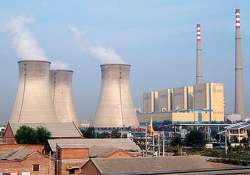China Suspends Approvals For New Nuclear Plants
Beijing, Mar 16: China has suspended the approval process for new nuclear plants to allow for a revision of safety standards in the existing ones amid Japan's nuclear crisis. "The Central Cabinet presided over by

Beijing, Mar 16: China has suspended the approval process for new nuclear plants to allow for a revision of safety standards in the existing ones amid Japan's nuclear crisis.
"The Central Cabinet presided over by Prime Minister, Wen Jiabao has ordered the suspension of approval process for nuclear power stations so that safety standards can be revised after the explosion at a Japanese plant," an official statement was quoted as saying by the state-run news agency Xinhua.
"It also asked the relevant departments to do safety checks at the existing plants", it said.
China currently has 13 high power nuclear power plants in operation and approved 26 more, mostly 1000 mw and above, expected to be ready in the next five years.
Energy hungry China has embarked on nuclear power expansion on a massive scale with plans to build about 60 nuclear reactors (according to recent official reports) to reduce dependence on highly polluting thermal power plants.
Initially, China dismissed the radiation crisis in Japanese power plant stating that its power plants mostly located in the coastal areas were safe as they were made up of latest design.
Some of the Japanese companies along with French and US nuclear power companies were involved in the construction of power plants in China besides the indigenous ones.
While some called for a comprehensive legislation to govern the use of nuclear power, an official newspaper called for more public scrutiny of safety features of the plants.
"Atomic energy law should define the responsibility of the agencies involved in nuclear development, supervision mechanism, contingency planning and compensation," said Chen Jinyuan, a nuclear inspector at the Ministry of Environmental Protection.
A draft law in this regard is awaiting official clearance since 1984, he said.
Voicing its concern over nuclear radiation in the country, the Chinese daily "Global Times" said that the government needs to keep public sentiment in mind and respond actively.
"China's nuclear power capacity currently stands at 10.8 gigawatts, or 1 per cent of the national output. This ratio is much lower than that of countries like Japan and France," it said.
However, China which has got 26 nuclear power units under construction, will become a major testing ground for nuclear power security within a few decades, it said.
Citing several instances of nuclear leakage in developed countries like Soviet Union, Japan and the US, the daily said that though no accidents have been reported in Chinese plants so far, but "there is no guarantee of absolute safety".
With limited coal and oil, and the country's rivers already heavily dammed, meeting this soaring demand with nuclear power is inevitable, it said.
It is questionable whether China will stick to a proper pace of nuclear power development, and maintain strictest safety standards in selecting its construction sites, the daily added. PTI
"The Central Cabinet presided over by Prime Minister, Wen Jiabao has ordered the suspension of approval process for nuclear power stations so that safety standards can be revised after the explosion at a Japanese plant," an official statement was quoted as saying by the state-run news agency Xinhua.
"It also asked the relevant departments to do safety checks at the existing plants", it said.
China currently has 13 high power nuclear power plants in operation and approved 26 more, mostly 1000 mw and above, expected to be ready in the next five years.
Energy hungry China has embarked on nuclear power expansion on a massive scale with plans to build about 60 nuclear reactors (according to recent official reports) to reduce dependence on highly polluting thermal power plants.
Initially, China dismissed the radiation crisis in Japanese power plant stating that its power plants mostly located in the coastal areas were safe as they were made up of latest design.
Some of the Japanese companies along with French and US nuclear power companies were involved in the construction of power plants in China besides the indigenous ones.
While some called for a comprehensive legislation to govern the use of nuclear power, an official newspaper called for more public scrutiny of safety features of the plants.
"Atomic energy law should define the responsibility of the agencies involved in nuclear development, supervision mechanism, contingency planning and compensation," said Chen Jinyuan, a nuclear inspector at the Ministry of Environmental Protection.
A draft law in this regard is awaiting official clearance since 1984, he said.
Voicing its concern over nuclear radiation in the country, the Chinese daily "Global Times" said that the government needs to keep public sentiment in mind and respond actively.
"China's nuclear power capacity currently stands at 10.8 gigawatts, or 1 per cent of the national output. This ratio is much lower than that of countries like Japan and France," it said.
However, China which has got 26 nuclear power units under construction, will become a major testing ground for nuclear power security within a few decades, it said.
Citing several instances of nuclear leakage in developed countries like Soviet Union, Japan and the US, the daily said that though no accidents have been reported in Chinese plants so far, but "there is no guarantee of absolute safety".
With limited coal and oil, and the country's rivers already heavily dammed, meeting this soaring demand with nuclear power is inevitable, it said.
It is questionable whether China will stick to a proper pace of nuclear power development, and maintain strictest safety standards in selecting its construction sites, the daily added. PTI